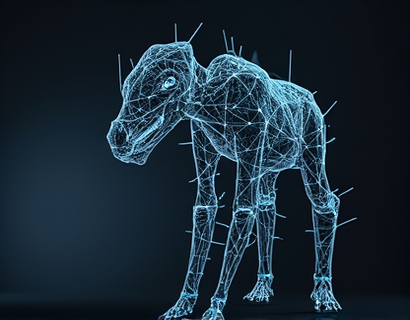Decentralized Authentication: Revolutionizing Business Security and Access Efficiency
In an era where digital transformation is reshaping the business landscape, security and efficiency have become paramount. Organizations are increasingly seeking innovative solutions to protect sensitive data while ensuring seamless access for users. Decentralized authentication has emerged as a game-changing approach, offering advanced identity management solutions that not only enhance security but also streamline access processes. This article delves into the concept of decentralized authentication, its benefits, and its role in revolutionizing business security and access efficiency.
Understanding Decentralized Authentication
Decentralized authentication refers to a system where user identities are managed across a distributed network rather than being stored in a central database. This approach leverages blockchain technology and cryptographic methods to create a secure and efficient identity management framework. Unlike traditional authentication methods that rely on centralized servers, decentralized authentication empowers users by giving them control over their own identities.
The Need for Enhanced Security
As cyber threats continue to evolve, businesses face increasing challenges in safeguarding sensitive information. Data breaches, identity theft, and unauthorized access can have devastating consequences, including financial loss, reputational damage, and legal repercussions. Traditional authentication methods, such as passwords and centralized databases, are often vulnerable to attacks, making it essential for organizations to adopt more secure solutions.
Challenges of Traditional Authentication
- Single Point of Failure: Centralized systems are susceptible to attacks that can compromise the entire database.
- Weak Passwords: Many users rely on easily guessable passwords, making accounts vulnerable to unauthorized access.
- Data Breaches: Centralized storage of user data increases the risk of large-scale data breaches.
- Complex User Management: Managing user identities across multiple platforms can be cumbersome and inefficient.
Benefits of Decentralized Authentication
Decentralized authentication offers a myriad of benefits that address the shortcomings of traditional methods. By leveraging advanced technologies, organizations can enhance security, improve user experience, and streamline access processes.
1. Enhanced Security
Decentralized authentication significantly reduces the risk of data breaches. Since user identities are not stored in a central location, attackers face greater challenges in accessing sensitive information. Additionally, cryptographic techniques ensure that user data is encrypted and secure, making it nearly impossible for unauthorized parties to gain access.
2. User Control and Privacy
With decentralized authentication, users have greater control over their identities. They can manage their personal information and choose what data to share with organizations. This level of control enhances user privacy and fosters trust between businesses and their customers.
3. Seamless User Experience
Decentralized authentication simplifies the login process for users. By utilizing technologies such as biometrics, smart cards, and mobile devices, organizations can provide a frictionless experience that eliminates the need for complex passwords. This not only improves user satisfaction but also reduces the likelihood of password-related issues.
4. Improved Operational Efficiency
By streamlining access processes, decentralized authentication enhances operational efficiency. Organizations can reduce the time and resources spent on managing user identities and access controls. This allows IT teams to focus on more strategic initiatives rather than dealing with password resets and account management.
5. Scalability
Decentralized authentication systems are inherently scalable. As organizations grow and evolve, their identity management needs change. Decentralized solutions can easily adapt to accommodate new users, devices, and applications without the need for extensive reconfiguration.
Implementing Decentralized Authentication
Transitioning to decentralized authentication requires careful planning and execution. Organizations must consider several factors to ensure a successful implementation.
1. Assessing Business Needs
Before implementing decentralized authentication, businesses should assess their specific needs and objectives. Understanding the unique challenges and requirements of the organization will help in selecting the right solution.
2. Choosing the Right Technology
There are various technologies available for decentralized authentication, including blockchain, public key infrastructure (PKI), and decentralized identity protocols. Organizations should evaluate these options based on their security requirements, scalability, and ease of integration with existing systems.
3. User Education and Training
For decentralized authentication to be effective, users must understand how to manage their identities securely. Organizations should provide training and resources to educate users about the benefits of decentralized authentication and best practices for maintaining security.
4. Integration with Existing Systems
Seamless integration with existing systems is crucial for a successful transition. Organizations should ensure that the decentralized authentication solution can work alongside current applications and infrastructure without causing disruptions.
5. Continuous Monitoring and Improvement
Once implemented, organizations should continuously monitor the performance of their decentralized authentication system. Regular assessments and updates will help identify potential vulnerabilities and ensure that the system remains effective in addressing evolving security threats.
Real-World Applications of Decentralized Authentication
Decentralized authentication is being adopted across various industries, demonstrating its versatility and effectiveness in enhancing security and access efficiency.
1. Financial Services
The financial sector is particularly vulnerable to cyber threats, making robust security measures essential. Decentralized authentication allows banks and financial institutions to verify user identities securely while providing a seamless experience for customers. By leveraging biometric authentication and blockchain technology, these organizations can enhance security and reduce fraud.
2. Healthcare
In the healthcare industry, protecting patient data is of utmost importance. Decentralized authentication enables healthcare providers to manage patient identities securely while ensuring compliance with regulations such as HIPAA. This approach not only enhances security but also improves patient access to their medical records.
3. E-commerce
As online shopping continues to grow, e-commerce businesses must prioritize security to protect customer information. Decentralized authentication provides a secure and efficient way to verify user identities, reducing the risk of fraud and enhancing customer trust.
4. Government Services
Government agencies are increasingly adopting decentralized authentication to enhance security and streamline access to services. By implementing secure identity management solutions, governments can improve citizen access to services while protecting sensitive information.
The Future of Decentralized Authentication
The future of decentralized authentication looks promising as organizations continue to recognize the importance of security and efficiency. As technology evolves, we can expect to see further advancements in decentralized identity management solutions.
1. Increased Adoption of Blockchain Technology
Blockchain technology will play a crucial role in the future of decentralized authentication. As more organizations adopt blockchain-based solutions, we can expect to see enhanced security, transparency, and trust in identity management.
2. Integration with Emerging Technologies
Decentralized authentication will increasingly integrate with emerging technologies such as artificial intelligence (AI) and the Internet of Things (IoT). This integration will enable organizations to create more sophisticated identity management solutions that enhance security and streamline access processes.
3. Regulatory Developments
As decentralized authentication gains traction, regulatory bodies will likely develop guidelines and standards to govern its use. Organizations must stay informed about these developments to ensure compliance and maintain security.
Conclusion
Decentralized authentication is revolutionizing business security and access efficiency by providing advanced identity management solutions that protect sensitive data and improve operational performance. As organizations continue to face evolving cyber threats, adopting decentralized authentication will become increasingly crucial for robust access control and identity management. By embracing this innovative approach, businesses can enhance security, streamline access processes, and ultimately foster trust with their users.











































